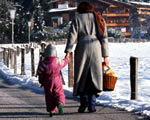 Go to main content
Go to main content
Archive Website of the UK government
Please note that this website has a UK government accesskeys system.
Main menu
Page menu
Home and community

Staying warm in winter

Keeping warm over the winter months can help prevent colds, flu or more serious health problems like pneumonia. Find out some simple things you can do to keep warm, stay healthy and make the best use of your heating at home.
Financial help with heating your home
If you are over 60, disabled or on a low income, you may be able to get financial help to heat your home.
For more information on schemes like cold weather payments, winter fuel payments and Warm Front, see ‘Help with heating your home’.
Stay warm in your home
Cold Weather Payment
If you're receiving certain benefits during very cold weather, you may qualify for a Cold Weather Payment
There are some simple tips to stay warm and safe in your home during the winter.
A warm home during the day
To keep warm at home during the day try to:
- heat your main living room to around 18-21°C (64-70°F) and the rest of the house to at least 16°C (61°F)
- heat all the rooms you use in the day
- make sure you keep your living room warm throughout the day and heat your bedroom before going to bed
- set the timer on your heating to come on before you get up and switch off when you go to bed
In very cold weather, set the heating to come on earlier, rather than turn the thermostat up. This means you won’t be cold while you wait for your home to heat up.
A warm home at night
To keep safe and warm at home during the night you should:
- try to keep the temperature above 18°C (65°F) in your bedroom overnight
- open the window or door a little at night for ventilation if you use a fire or heater in your bedroom during winter
- never use hot water bottles in the same bed as an electric blanket, even if the blanket is switched off
- unplug blankets before you go to bed, unless they have a thermostat control for safe all-night use
- get your electric blanket tested every three years for safety – Age UK or your local fire and rescue service may be able to do this for you
To be put in touch with an Age UK group near you, call Age UK’s freephone advice line on 0800 169 6565.
Keep the heat in with insulation
Insulation makes your home warm and healthy and will also help to keep your heating costs down. It’s a good idea to:
- fit draught-proofing to seal any gaps around windows and doors
- make sure your loft has at least 10–11 inches (270 millimetres) of insulation - any home with 4 inches (100 millimetres) or less should have it topped up
- make sure wall cavities are insulated
- insulate your hot water cylinder and pipes
You may also be able to get financial help to insulate your home. Read the article 'Help with heating your home' to find out more.
Dress warmly
You can help keep warm by:
- wearing plenty of thin layers, rather than one thick one
- putting on a coat, hat, scarf, gloves and warm shoes or boots when you go outside
- wearing clothes made of wool, cotton or fleecy synthetic fibres
- wearing bed socks and thermal underwear at night
Stay healthy in winter
There are things you can do that will reduce the risk of illness and protect you against the cold.
Get an annual flu jab
You can get a free jab if you:
- have serious heart, lung or kidney disease or diabetes
- have a weak immune system, caused by disease or medical treatment
- have had a stroke or TIA (transient ischaemic attack)
- are aged 65 years or over
- are pregnant
Contact your GP or talk to your pharmacist if you think you might qualify for a free flu jab.
Eat well
Eating regular meals will help keep your energy levels up during winter. Try to:
- have plenty of hot food and drinks
- plan your meals and keep your diet as varied as possible
- aim to include five portions of fruit and vegetables daily - this includes tinned and frozen fruit and vegetables
Stay active
Exercise is good for your overall health and it can keep you warm in winter. Even a small amount of exercise can bring health benefits. If possible, try to move around at least once an hour.
Recognise the signs of hypothermia
Hypothermia is caused by getting too cold. Older people, babies and people with certain health conditions are among those more at risk.
Shivering can be used as a guide to how severe hypothermia is. If a person can stop shivering on their own, the hypothermia is mild. If they can’t stop shivering, it’s moderate to severe. Severe hypothermia needs urgent medical treatment in hospital.
See NHS choices for full details of the symptoms and causes of hypothermia.
Who to contact if you need further help
If you are worried about a relative or an elderly neighbour, contact your local council. You can also call the free Age UK advice line on 0800 169 6565.
 Facebook
Facebook Twitter
Twitter StumbleUpon
StumbleUpon Delicious
Delicious Reddit
Reddit
